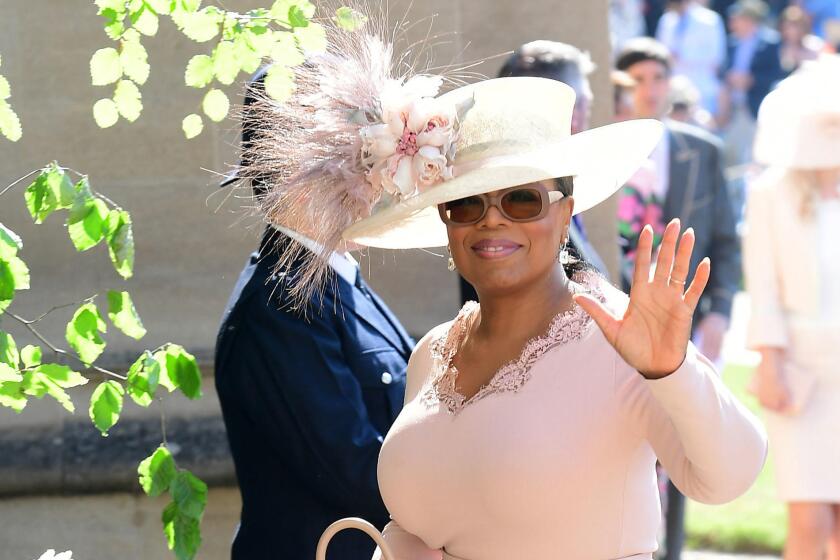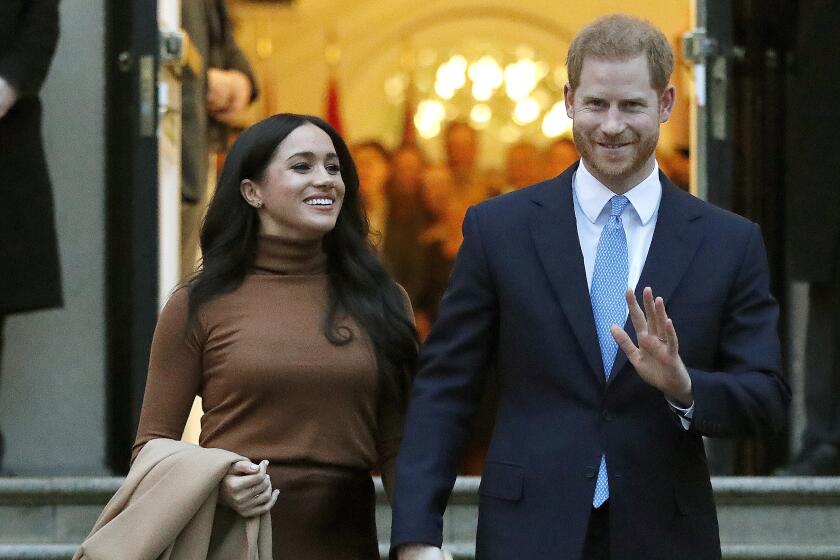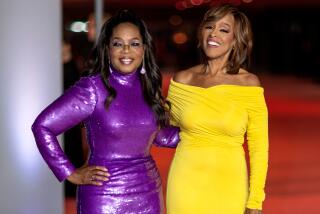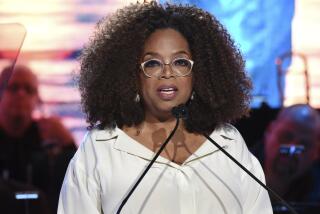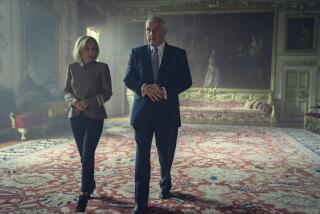Oprah’s interview with Harry and Meghan was damn good TV. What worked and what didn’t
- Share via
When Harry and Meghan met Oprah, millions of people felt many different things, including and especially that we miss Oprah Winfrey and the big celebrity interview very much.
Depending on the lens one chose to view Winfrey’s conversation with the Duke and Duchess of Sussex on Sunday, CBS’ two-hour “Oprah With Meghan and Harry” special had many alternate, and some contradictory, meanings.
For some, it was a surprisingly candid conversation about how this specific couple, hoping to modernize the House of Windsor through diversity and a new hybrid of duty and independence, were instead beaten back by racism — I don’t think anyone will be getting over the very pregnant Meghan saying that at least one family member had expressed concern about the darkness of their potential child’s skin any time soon.
Others — those familiar with the life of Harry’s mother, Princess Diana, and/or Peter Morgan’s series “The Crown” — saw a confirmation of what they already believe: The British monarchy is, at this point, an endangered and vampiric institution that survives by feeding on the souls of its members in the name of service in exchange for the frantic flower-waving love of millions and the ability to hunt stag at Balmoral.
Still others, of course, saw three mononymous deities of the celebrity universe pretending to feed “rescue chickens” while wallowing in privilege and taking up two hours of television better reserved for reruns of “The Puppy Bowl” or just about anything else. Even as a deadly pandemic continues to claim the lives of thousands on a daily basis, these critics observe, this trinity of wealth and influence gathered in the shelter of an undisclosed and exquisitely patio-ed Montecito estate to discuss how hard life can be when one has to pay for one’s own security detail. Honestly, it would have been quite impossible if not for a very large inheritance. And the Netflix and Spotify deals.
Undeniably, it was the highest-rated gender reveal party in the world (it’s a girl!) and a reminder that Oprah Winfrey knows how to make damn good television.
The two-hour extravaganza on CBS demonstrated the power of broadcast TV -- and Oprah Winfrey.
So good that more than 17 million Americans dredged from their memories the rituals of appointment viewing and sat through two hours of linear TV.
Even more miraculously, millions on the West Coast did this after all the really good stuff had been revealed on social media by Easterners who watched three hours earlier.
All so Oprah could lead Meghan and Harry through their version of the events that led them to forsake (or be stripped of) their royal status, as well as all the institutionalized money and perks that go with it, to begin life anew in Montecito.
This is, of course, what Oprah does best. The curation and display of the complicated personal narrative is the foundation of her empire and why her longtime daily talk show was the premier destination for anyone seeking to explain, clarify, advertise or apologize. Barbara Walters may have invented the “let’s get personal” celebrity interview, but Oprah popularized and perfected it. Whether you were a soccer mom with self-esteem issues or an A-lister with an addiction problem, Oprah was there for you. She wanted to hear your side of the story, and if she was quick to point out contradictions or, in some cases, remind you of the people you harmed, she was equally quick to empathize, particularly with the harm done by the silence of shame. Oprah was, more than anything else, a tireless breaker of that silence; in her public worldview, nothing is made better by the refusal to admit or acknowledge a challenge or flaw.
At her best, Oprah coaxed out stories with which millions could relate, acting as therapist-rabbi-mother-best friend to the world. At her worst, she trusted untrustworthy subjects or gave too many makeovers.
But in the 10 years since Oprah ended her daily show, the world has really seen her only at her best. As with her 2013 interview with disgraced cyclist Lance Armstrong, “Oprah With Meghan and Harry” reminded everyone that she remains the High Priestess of the celebrity confessional.
And also that we really need to bring the celebrity confessional back.
Oprah Winfrey’s sit-down with the Duke and Duchess of Sussex lays bare Britain’s divides over race, class and culture.
When Oprah decided to move behind the camera, via her creation of OWN and numerous other production roles, she took a fixture of the cultural narrative with her. The other great event-interviewers — Walters, Diane Sawyer, Katie Couric — had already for the most part fled the stage. Even Jay Leno and David Letterman, who once helped such stars as Hugh Grant, Kanye West and Michael Richards through their rockier moments, were gone.
Increasingly, stars, including Harry and Meghan, made their statements, told their versions, offered their apologies, feuds and confessions on social media — but even the best, most heartfelt statement or video lacks of the nuance and humanity of an in-person interview, in part because that kind of packaged messaging doesn’t allow for real-time reactions that can guide the continued conversation.
Oprah is the master of real-time reaction that guides the continued conversation.
As many pointed out Sunday night, one of Winfrey’s greatest strengths as an interviewer is her ability to actively listen, to be present in the moment rather than doggedly hit predetermined talking points or plow through a list of prewritten questions. So when Harry spoke of talking with his father, Prince Charles, “until he stopped taking my calls,” Oprah didn’t leave that, or us, hanging. She circled back and used that revelation to prompt Harry to discuss his relationships with his father and brother.
When Meghan discussed her declining mental health while pregnant with Archie, Winfrey pressed her several times on the seriousness of her feeling “that I didn’t want to live any more” and what steps she should have taken to help herself. “Couldn’t you check yourself in somewhere?” Winfrey asked, serving as the stand-in for any viewer skeptical about a royal being deprived of mental health resources.
“No,” Meghan said. “I couldn’t, you know, call an Uber to the palace.… I mean, you have to understand as well, when I joined that family, that was the last time, until we came here, that I saw my passport, my driver’s license, my keys. All that gets turned over.”
Two decades after a tragic end for Princess Diana, nothing has really changed at Buckingham Palace.
People can say, as Harry and Meghan repeatedly did, that members of the royal family are “trapped,” but those details — the passport, license and keys — and the way they were offered in almost exasperated explanation to Winfrey, gave visceral meaning to the word in a way that could occur only in an interview.
Or, to be more specific, a world-class interview. Winfrey may ask great questions, but she also understands the nature of silence better than anyone, possibly ever.
Indeed, the most enthralling aspect to her conversation with Harry and Meghan was the palpable tension surrounding many of the answers and some of the questions. Surely, certain areas of inquiry were anticipated, and some of the responses, particularly Meghan’s early insistence that she knew nothing of the hardships involved in royal life, seemed a bit rehearsed.
But many of Winfrey’s subsequent questions, particularly about the couple’s treatment by the royal family, were met with moments of silence that all but vibrated with the careful choice of the words that followed. Moments that highlighted how extraordinary it was for Harry and Meghan even to attempt to speak frankly, never mind how often they achieved that goal.
The couple could have continued to issue statements on social media, or what with the Netflix deal and all, offer their version of events via a well-produced video. Last year, Meghan wrote a moving account of her miscarriage for the New York Times; together, they could have written something similar about their decision, and the decisions that were made for them, regarding their change in status.
But in maintaining that kind of control, they would have lost the potential for emotional veracity. The power of the television interview — though absolutely enhanced through camera work and editing — lies in the interaction, in the moments that preface an answer, the moments that follow it.
Serena Williams, Amanda Gorman and Matt James are among the celebrities weighing in on Oprah Winfrey’s buzzy interview with Prince Harry and Meghan.
Winfrey’s interview was far from tough journalism — some key questions went unasked. What exactly did Harry, who famously once wore a Nazi uniform to a costume party, mean when he said he had to do the work to learn about racism? Did Meghan never think of leaving the marriage rather than consider killing herself? How could they keep praising the queen while continually criticizing the institution that she heads? What is Fergie, who was mentioned twice, really like?
Perhaps most important, none of them addressed the elephant in the room: If the royal family is afraid of the media, some of that fear comes from an ongoing attempt from certain quarters to end the monarchy. Where, exactly, does the couple stand on that issue?
But it wasn’t that kind of interview. Former actress Meghan Markle is an American woman who, by dint of her marriage, has been the target of relentlessly hateful and often blatantly racist press. (Remember when the Daily Mail said she was “(almost) straight out of Compton?”)
Despite the California sunshine, Meghan’s second-trimester radiance and the rejuvenating sight of Winfrey doing what she does best, “Oprah With Meghan and Harry” was a haunted two hours of television. After Meghan spoke of the constant tabloid intrusion and lack of internal support that pushed her to suicidal thoughts, no one needed Harry to explain why he feared “history was repeating itself.”
The specter of his mother, Diana — the People’s Princess, literally hounded to death even after she was divorced from Prince Charles — hung over the interview, evoking the obvious question: How many young women must be driven to near-suicide before Great Britain decides to either end its monarchy or stop throwing its most vulnerable members to the wolves?
That, and when is Oprah going to interview Britney Spears?
More to Read
The biggest entertainment stories
Get our big stories about Hollywood, film, television, music, arts, culture and more right in your inbox as soon as they publish.
You may occasionally receive promotional content from the Los Angeles Times.
